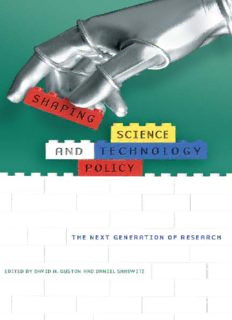Table Of Content
Series Editors
Daniel Lee Kleinman
Jo Handelsman
Shaping Science and
Technology Policy
The Next Generation of Research
Edited by
.
and
The University of Wisconsin Press
1930 Monroe Street
Madison, Wisconsin 53711
www.wisc.edu/wisconsinpress/
3 Henrietta Street
London WC2E 8LU, England
Copyright © 2006
The Board of Regents of the University of Wisconsin System
All rights reserved
1 3 5 4 2
Printed in the United States of America
Library of Congress Cataloging-in-Publication Data
Shaping science and technology policy: the next generation of research /
edited by David H. Guston and Daniel Sarewitz.
p. cm.—(Science and technology in society)
Includes bibliographical references and index.
ISBN 0-299-21910-0 (cloth: alk. paper)
ISBN 0-299-21914-3 (pbk.: alk. paper)
1. Science and state—Decision making.
2. Technology and state—Decision making.
3. Research—International cooperation.
4. Science and state—Citizen participation.
5. Technology and state—Citizen participation.
I. Guston, David H. II. Sarewitz, Daniel R. III. Series.
Q125.S5164 2006
338.9´26—dc22 2006008594
Foreword vii
.
Acknowledgments ix
Introduction 3
.
7
1. Ethics, Politics, and the Public: Shaping the Research
Agenda 10
.
2. Federal R&D: Shaping the National Investment Portfolio 33
.
3. Universities and Intellectual Property: Shaping a New
Patent Policy for Government Funded Academic
Research 55
.
4. Geography and Spillover: Shaping Innovation Policy
through Small Business Research 77
.
.
99
5. EPA’s Drinking Water Standards and the Shaping of
Sound Science 102
.
6. The Case of Chemical Hormesis: How Scientific Anomaly
Shapes Environmental Science and Policy 124
v
vi Contents
7. Earmarks and EPSCoR: Shaping the Distribution,
Quality, and Quantity of University Research 149
.
8. Innovation in the U.S. Computer Equipment Industry:
How Foreign R&D and International Trade Shape
Domestic Innovation 173
.
195
9. Shaping Technical Standards: Where Are the Users? 199
10. Technical Change for Social Ends: Shaping
Transportation Infrastructures in U.S. Cities 217
.
11. Shaping Infrastructure and Innovation on the Internet:
The End-to-End Network That Isn’t 234
12. Technology Policy by Default: Shaping Communications
Technology through Regulatory Policy 256
.
273
13. Engaging Diverse Communities in Shaping Genetics
Policy: Who Gets to Shape the New Biotechnology? 276
14. Informed Consent and the Shaping of British and U.S.
Population-Based Genetic Research 291
15. Embryos, Legislation, and Modernization: Shaping Life
in the UK and German Parliaments 312
16. Reconceptualizing Technology Transfer: The Challenge
of Shaping an International System of Genetic Testing
for Breast Cancer 333
About the Editors 359
About the Contributors 361
Index 365
.
The best view of the future is through the eyes of younger scholars
who are not yet committed to the view that the future is an evolutionary
extensionofthepast.Theworkoftheseauthors,selectedcompetitively
fromalargenumberofcandidates,addressesavarietyofnewissuesfrom
originalperspectives.Manyoftheideastheypresentwillnotfindquick
acceptance in the federal bureaucracy. They are explorations of how
scienceandtechnologyoughttoreflecttheconsensusgoalsofsociety.
The new perspective takes a more integrated view of policy for sci-
enceandscienceforpolicy,recognizingthateachisadriveroftheother.
Although the papers are organized into sections for policy, for science,
for technology, and for the new genetics, this generation of scholars no
longer wastes time fussing over the distinctions among these categories.
Theirviewisasoftenglobalasitisdomestic.Noristhereevenawhiff
of technological determinism in this writing. The outcomes of debates
about policy are, in the authors’ views, clearly shaped by social, cultural,
and political forces. But neither do the authors fall into the trap of social
construction; both technical facts and gaps in knowledge command at-
tention here.
David Guston and Dan Sarewitz have made an important contribu-
tion to the health of science and technology policy studies in identifying
and giving visibility to this group of up-and-coming scholars. In their
workthereareagendasforresearchthatdeservesupportfromboth gov-
ernment funding agencies and foundations.
Unfortunately,thereareveryfewplaceswherescienceandtechnol-
ogy policy researchers, especially the younger generation of scholars,
canfindresearchsupport.Theunintendedconsequenceofthisunfortu-
natesituationisthattheyoungerresearchersareoftenlookingtofunded
vii
viii Foreword
problem-solving projects outside academic support, with the result that
their tendency to look at both theoretical constructs and practical ideas
concurrently is reinforced.
This conference is the second of its kind, to my knowledge, the first
having taken place in Hawaii some years ago. It ought to become a pe-
riodic event, with both the conference and the publication of its papers
supported by one or more foundations or federal agencies. So long as
science and technology policy research has no institutional home in the
United States, mechanisms to bring the younger investigators together
occasionally are particularly important.
The debt owed to individuals and organizations for the production of
any book is substantial. The debt accumulated for this volume may be
alittlemoreso,asitistheproductofagreatmanytalentedhandsand
mindsparticipatingoveranumberofyearsinthe“NextGen”project.
Derived from a conference sponsored by the National Science Foun-
dation (NSF), the chapters of this volume represent but a fraction of
the scholarly and professional effort embodied in the Next Generation
project.
We owe Rachelle Hollander and Joan Siebert at NSF, along with
anonymousreviewers,manythanksforhelpingusrefineand,ultimately,
forapprovingourproposalfortheconferenceandthisvolume.Toour
program committee—Steve Nelson, Lewis Branscomb, Sharon Dun-
woody, Diana Hicks, Gene Rochlin, Paula Stephan, Willie Pearson,
Mike Quear, and Chuck Weiss—we offer our esteem and gratitude for
helping us whittle down the original ninety proposals we received in
overwhelming response to our solicitation, to the roughly two dozen
younger scholars we invited to speak at the conference. Several mem-
bers of the program committee also served as discussants at the confer-
ence, as did Barry Bozeman, Andrew Reynolds, Helga Rippen, Chris-
topher Hill, David Goldston, and Lee Zwanziger.
The project was a cooperative endeavor of Rutgers, The State Uni-
versity of New Jersey, where one of us then taught, and the Center for
Science, Policy, and Outcomes, then of Columbia University, which the
other of us directs. Linda Guardabascio and Fran Loeser at Rutgers
were remarkably helpful with the grant management side of the equa-
tion, and Ellen Oates with the administrative and editorial side. At
CSPO, Stephen Feinson and Shep Ryen kept the project on track. We
ix
Description:With scientific progress occurring at a breathtaking pace, science and technology policy has never been more important than it is today. Yet there is a very real lack of public discourse about policy-making, and government involvement in science remains shrouded in both mystery and misunderstanding.

